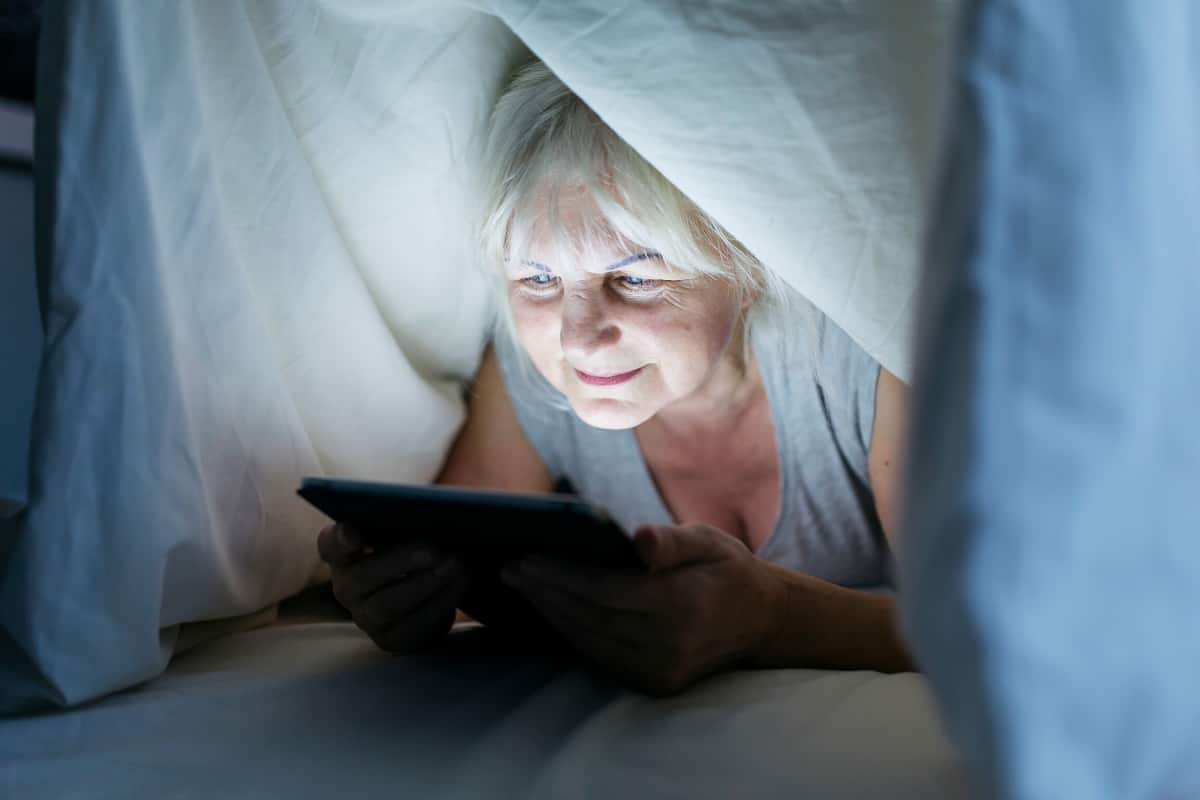The Risks of Clinical Insomnia

Trouble falling asleep and staying asleep is a common and frustrating menopause symptom that can start during perimenopause and last well past menopause.
Hot flashes at night, also known as night sweats, are a common cause of sleep disturbance, but multiple factors can be involved in your sleep troubles as you age. It’s important to understand the root cause of sleep disturbance. Here we’ll discuss some of the main causes of insomnia in menopause and ways you can prevent and treat it.
Insomnia, Menopause, and Aging
Insomnia is characterized by persistent sleep difficulties. Some people with insomnia can’t fall asleep, others repeatedly wake up across the night, or they wake up too early and can’t go back to sleep.
While almost everyone experiences sleeplessness at some point, insomnia refers to at least three days per week of sleep challenges that have been bothering you for over three months. True insomnia is often highly disruptive to someone’s life, making it hard to function the next day.
Experts estimate that about 25% of women around menopause would qualify for a diagnosis of insomnia.
Women who develop insomnia around menopause are awake more at night and get poorer quality sleep. Half sleep fewer than six hours per night.
Insomnia in menopause has been related to objective sleep alteration, which has been recently indicated as the most severe phenotype of insomnia leading to the most severe consequences.
Health Risks of Insomnia
Exhaustion from insomnia can affect work performance, memory, and reaction time and leave you at greater risk of being involved in an accident during your waking hours. Exhaustion can also be detrimental to your overall health.
Researchers have found that over time, disordered sleep can lead to a host of potentially serious health problems:
- Glucose insensitivity and greater risk of developing diabetes.
- Obesity
- Heart disease
- Elevated blood pressure (closely linked to sleep apnea)
- Anxiety and depression
The Insomnia – Hot Flash Connection
One of the unique factors in menopause-related insomnia in menopause is the presence of hot flashes. Night sweats can begin in perimenopause and last for up to a decade. These frequent and unrelenting occurrences not only wake you up but understandably cause frustration and anxiety that further interferes with sleep.
The most obvious clue that your insomnia is related to night sweats is if you wake up during the night sweating, and/or you might also wake up feeling hot and with a racing heart.
Other Factors
Are you snoring?
Sleep apnea, a serious breathing difficulty, becomes more common with menopause, age and weight gain. Ask your sleep partner or record yourself while you sleep to see if you’re snoring. New onset of or worsening of snoring means you should get further testing with a healthcare provider.
Do you lie in bed with racing thoughts?
Finding it difficult to turn your brain off? You could be experiencing anxiety or stress that’s interfering with falling asleep.
Are you managing depression?
Depression becomes more common around menopause, and can interfere with sleep. Unfortunately, medications for depression can also make sleep more challenging.
Evaluation and Treatment
Talk to your healthcare provider if you think you have insomnia, regardless of whether you understand why it’s happening. Sleep is such an important part of your health that getting help sooner rather than later is always the best approach.
There is no cure-all for insomnia, but you have options to improve your rest and make sure you can function well during the day.
Sleep Hygiene
Everyone, especially those with insomnia, should follow healthy sleep hygiene practices. Don’t miss the article on all of the best sleep hygiene habits in the Sleep section of the resource tool kit.
Cognitive Behavioral Therapy for Insomnia (CBT-I)
The gold standard treatment for insomnia is cognitive behavioral therapy for insomnia (CBT-I). If you have insomnia, you’ve likely developed patterns of thoughts and behaviors around sleep that are contributing to ongoing sleep struggles. CBT-I helps you recognize and restructure these habits to create more mental and physical relaxation around sleep. It takes some time and effort, but CBT-I has long-lasting results and high satisfaction rates.
Exercise
Research shows that exercise can help you fall asleep faster and sleep longer. Just be sure not to perform high-intensity exercise too close to bedtime. This may activate your metabolism and raise your body temperature, which can make falling asleep harder.
Meditation
In a randomized controlled study, mindfulness meditation was found to be a viable treatment option for chronic insomnia.
Meditation can help reduce stress, improve your outlook, better manage pain, and create a feeling of relaxation—especially at the crucial moment before bedtime to prepare the body for sleep.
Although more research is needed, the current evidence suggests that meditation can perform as well as exercise and CBT-I.
Supplements & Medication
Melatonin supplements might help you fall asleep at the right time, but there is not yet enough research to claim that they will help with chronic insomnia. Melatonin is considered a safe supplement with only a few minor side effects.
Valerian root is an herbal supplement that may help people fall asleep faster and stay asleep longer. It can interact with some medications, so talk to your healthcare provider before taking valerian.
If all else fails, talk to your healthcare provider about prescription sleep aids. In the short term, they may help you get some much-needed rest. However, prescription medications can have numerous side effects, and your body can become dependent on them for sleep. It’s best to take them as infrequently as possible.
Sign up for more unique women’s health content
By submitting this form, you agree to the Lisa Health Privacy Policy and Terms of Use


